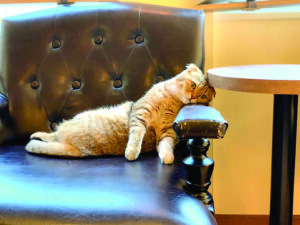By Dr. Beth Leermakers
Me-owwww … Your cat may be trying to tell you she’s in emotional pain. Cats are emotional creatures who can become stressed or depressed. Many cat owners don’t recognize the sometimes subtle signs of a sad cat.

JAPAN: This cute cat has became popular on social media after its photo with a tired and depressed look spread online gathering more than 260,000 reactions.
What Causes
Depression in Cats?
Loss of a family member. Although we often think of cats as being aloof and independent, cats grieve the loss of a loved one. When a family member moves out or passes away, your cat will feel the loss if she was connected to that person. Cats may also grieve when a feline or canine companion dies or leaves. Loss of a friend is the most common cause of feline depression.
Adding a new family member. The arrival of a new baby (or adult), cat or dog can be stressful for cats, who are easily upset by changes in routine.
Moving to a new house. A change in environment is stressful for cats and their people. If you move to a smaller home, your cat has less room to explore and fewer opportunities for physical activity — contributing to depression.
Schedule changes. If your work schedule changes — e.g., you go back to the office after working remotely — your cat may miss you. When you travel, leaving your cat at a boarding facility or with a pet sitter, your cat doesn’t know if or when you’re returning. That can lead to depression.
Changes in physical health. When an active cat develops arthritis and can no longer jump onto the bed or sit in her favorite spot on top of the refrigerator, she may become depressed and miss out on enrichment activities. As an older cat starts losing her sight, she won’t be able to navigate her world as easily. That adjustment can be very stressful.
Many of the signs of feline depression are similar to those seen in people. Feline depression symptoms can mirror those of many serious medical conditions, including diabetes, kidney failure and pancreatitis. If your cat displays any of these signs, start by visiting your veterinarian to rule out illness, injury (causing pain) or dental problems.
Low energy levels. Cats usually spend most of the day sleeping. A depressed cat will sleep even more. If your cat is sleeping more than usual, or lacks energy, she could be unhappy. Unusually low energy is often a sign of a mental or physical problem.
Decreased appetite. If your cat’s eating behavior changes, or he loses interest in his regular diet, he may be depressed. Loss of appetite may be due to an illness or dental problems, so consult your veterinarian to rule out a physical cause.
Litter box changes. Urinating more frequently in the litter box, or not consistently using the litter box, can be signs of depression or illness. Take your cat to the vet if she isn’t using her litter box consistently.
Pain. Pain is one of the most underdiagnosed conditions in cats, especially among seniors. It is one of the leading clinical signs of depression.
Decreased time spent grooming. Depressed cats often stop grooming themselves, leaving their coat unkempt.
Loss of interest in usual activities. If your cat no longer plays with her favorite toys or interacts with her feline, canine and human friends, she is probably unhappy.
Aggression. Unhappy cats become more aggressive. If your cat displays aggressive behavior — hissing, biting, scratching, growling and chasing — visit your veterinarian.
Increased vocalizations. When a cat loses a close companion, he will roam around the house meowing, as if looking for his absent friend. If your cat is crying or meowing more than usual, something is wrong.
Depression is associated with a poor immune system that can leave your cat vulnerable to illness. Therefore, it’s important to address your cat’s depression as soon as possible.
Play with your cat. Cats need mental stimulation to prevent boredom, and physical activity is a good stress reliever. Playing with your sad kitty may reduce her aggression. Choose toys that encourage hunting behavior: stalking, pouncing, climbing and leaping into the air, while using their keen senses of vision, smell and hearing.
Pet your cat. Cats want attention and love from their caretakers. Spending quality time with your kitty can reduce her depression. Many cats enjoy being petted, and petting them may reduce stress in some cats. Cats seem most comfortable with gentle pets on the sides of the face. You can slowly move your hand along the sides of the neck and shoulders.
Provide catnip. When cats smell catnip, the scent travels to their brain, triggering a feeling of euphoria, which typically lasts about 10 minutes before gradually wearing off. That mild natural high is harmless and pleasurable to cats.
Adopt a companion. If your cat is missing her feline or canine buddy, or is lonely when you’re at work, it may be time for a new friend. If you’re not sure your kitty will accept a new fur-sibling, start by fostering a cat or dog.
Consult an expert. If these strategies don’t improve your cat’s mood, it’s time to visit a board-certified animal behaviorist.
